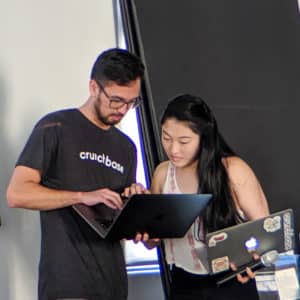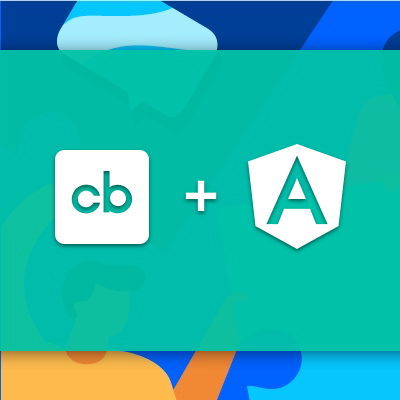In our most recent internal hackathon at Crunchbase, we reframed the typical hackathon to embody a core set of values and focused on what our team would take away from the event once it was over.
🎯 Creating values
As a company, we pride ourselves on being value-focused. As we began planning our hackathon, we knew we wanted our event to reflect values of its own and, at the same time, avoid some of the common pitfalls of hackathons. Not only did having a core set of values give us a starting framework for how to begin planning the event, but it also made it easy to gather feedback and get buy-in from every department.
Embrace audaciousness
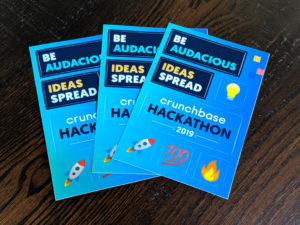
As a growing company, it can be easy for us to tunnel-vision on our day-to-day
constraints and processes. We sometimes forget to look at our work from a different angle and explore what possibilities we might be missing. For us, being audacious means taking risks trying something new, making mistakes that we might not be comfortable with otherwise, and focusing on all of the what-ifs along the way to a demo that wins prizes. Not only did we see this as a way to broaden the typical focus of the hackathon, we saw it as an opportunity to encourage teams to explore brainstorming techniques together.
Foster cross-department teamwork
Providing an opportunity for people from different departments of the company to team up, brainstorm, and collaborate is one of the primary benefits of a hackathon. We heard consistent feedback from our teams that they were interested in learning more about specific initiatives and the expertise of other departments. It was one of our top priorities when planning to create an atmosphere that would get our team excited about learning from one another and to help facilitate that collaboration.
Build it better
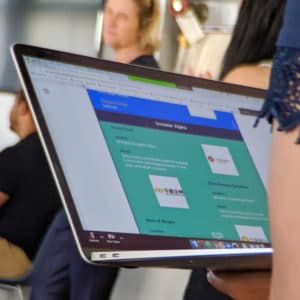 Being audacious doesn’t always need to be a brand new idea, it can also revisiting areas that we might have overlooked in the past that could delight our customers or improve the day-to-day workflow of our team. Individuals participating in the hackathon were able to decide what ideas they would be passionate about working on and, at the end of the day, our goal was to really understand those ideas and bring them to life.
Being audacious doesn’t always need to be a brand new idea, it can also revisiting areas that we might have overlooked in the past that could delight our customers or improve the day-to-day workflow of our team. Individuals participating in the hackathon were able to decide what ideas they would be passionate about working on and, at the end of the day, our goal was to really understand those ideas and bring them to life.
📏 Measuring success
When we are developing new processes or product features, we start by establishing goals for what we are aiming to achieve and then we decide how we will measure success. We wanted our event to be no different.
Is our team satisfied with the event we created?
As event organizers, one of our top priorities is to create an event that runs smoothly and includes appropriate logistical constraints for our participants. For example, we planned for teams to demo during our weekly town hall meeting, which is an hour-long maximum, and we had 17 teams signed up. With an introduction, time for voting, and an awards ceremony, how would we fit all of the demos into an hour? We implemented a very strict rule that demos could only be two minutes in length. Would teams be happy with the limitation? Was an hour of demos too long for the audience?
Is our event engaging?
It can be difficult for many of our team members to set aside the responsibilities of their roles for an extended period of time. We wanted to build an event that would welcome, include, and engage team members who would not be participating in building demos. We planned to measure the attendance of each scheduled event during the hackathon and compare it to our overall company size. Our goal was that attendance would increase as the event cadence continued to build excitement.
Are individuals from different departments working together?
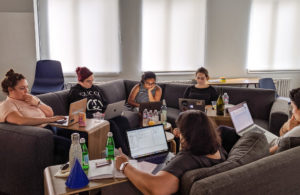 Our previous hackathons had been very engineering heavy, with a large portion of the teams participating being solo engineers creating their individual prototypes. Without having data from our past hackathons, we still knew we wanted to change the makeup of the groups and establish a benchmark for our future events.
Our previous hackathons had been very engineering heavy, with a large portion of the teams participating being solo engineers creating their individual prototypes. Without having data from our past hackathons, we still knew we wanted to change the makeup of the groups and establish a benchmark for our future events.
📣 The event
We wanted to move the focus away from creating impressive demos towards learning together as a team. To do this, we put together a month-long schedule that emphasized knowledge-sharing and brainstorming together.
Lunch and learns

To put the spotlight on the expertise of our team members, we held a speaker series to highlight subjects that would help teams throughout the process of the hackathon. Topics included tours of our codebase, intros to tools for creating low-code apps, brainstorming exercises, and learning how to build and deliver a pitch.
Brainstorming together
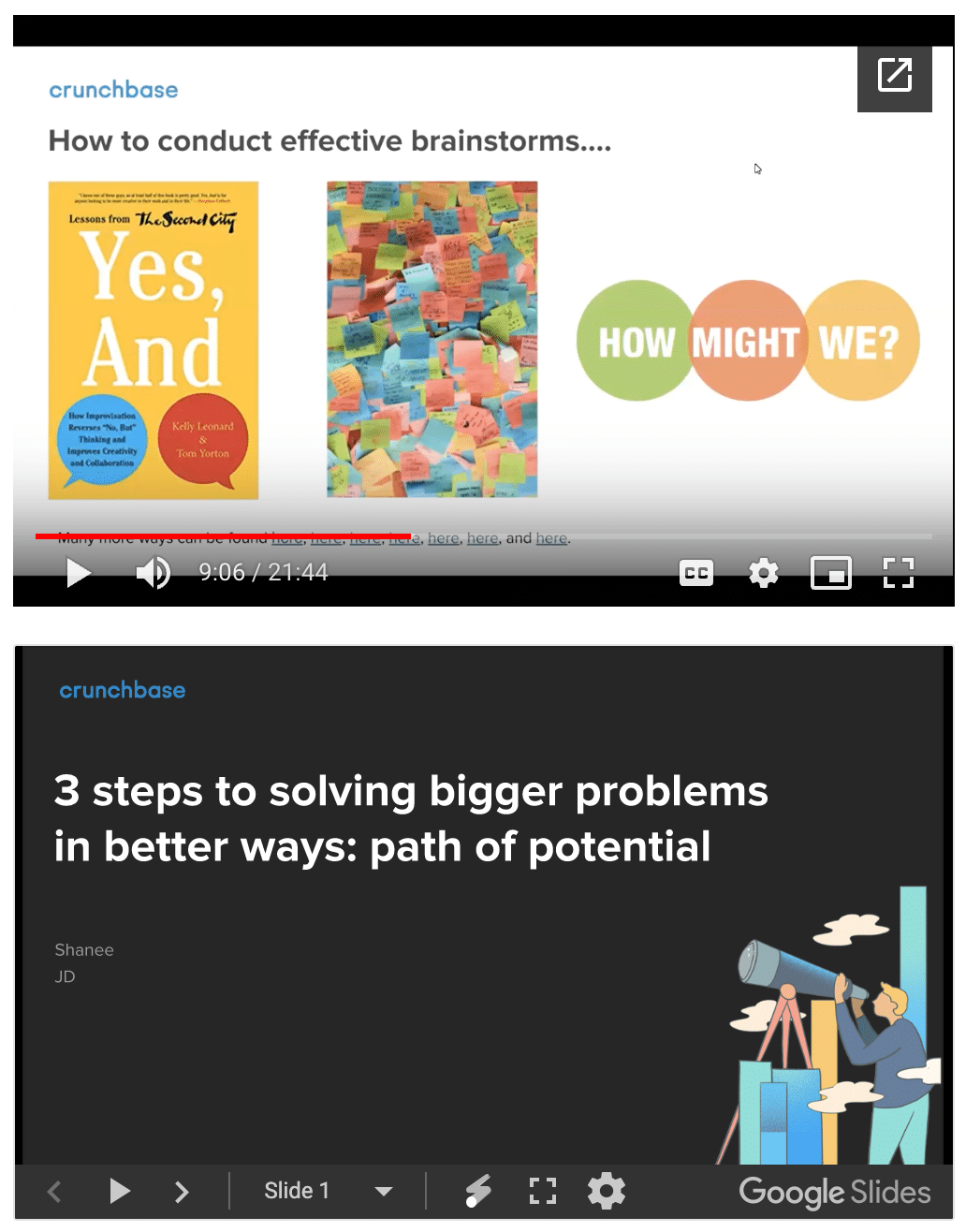 Our primary mode of team communication is Slack and we embraced it by creating a company-wide channel for hackathon brainstorming. This made it easy for us to capture all of the ideas, with direct links to the conversations, and pass them along for our product team to evaluate.
Our primary mode of team communication is Slack and we embraced it by creating a company-wide channel for hackathon brainstorming. This made it easy for us to capture all of the ideas, with direct links to the conversations, and pass them along for our product team to evaluate.
Forming teams
As we progressed through brainstorming towards creating demos, we asked teams to formalize and pitch their idea to the company at our weekly town hall meeting. This gave us an opportunity to encourage participation and cross-team collaboration by helping to pair teams with open spots to individuals.
Demos, awards, prizes
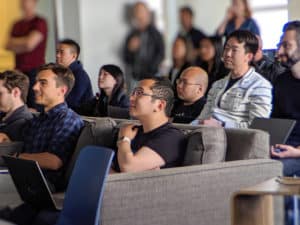 With all of the teams signed up, we set aside a few workdays to collaborate and create our demos together. To incentivize teams to build demos that would align with the event’s values, we created these award categories: Best Overall, Best No-Code, Customer Delight, Team Focused, Most Audacious
With all of the teams signed up, we set aside a few workdays to collaborate and create our demos together. To incentivize teams to build demos that would align with the event’s values, we created these award categories: Best Overall, Best No-Code, Customer Delight, Team Focused, Most Audacious
⚖️ The results
The final numbers of the hackathon went well above our expectations for the event:
- 🥗 Every lunch and learn had a live attendance of one-third of our company
- 🥅 We captured 70 new ideas for our product team to evaluate
- 👥 Nearly half of our company participated in creating demos
- 🤝 Over 60% of demo teams were cross-functional
- 📈 Engagement increased by 60% over the course of the event
- 💗 Our team gave the event a Net Promoter Score of 75
Outside of the numbers, we received extremely positive feedback that individuals felt included and encouraged to participate in the hackathon. We also generated a ton of great project ideas – some of which have already been included in the product – that will improve the quality of life for our team members and our customers.
Establishing core values helped us lay out the framework of a hackathon that helped us learn and grow as a team, but it was the team itself, with excitement and audaciousness all their own, that made the event a true success.
Want to participate in our next hackathon? Check out our open roles and join our team!


